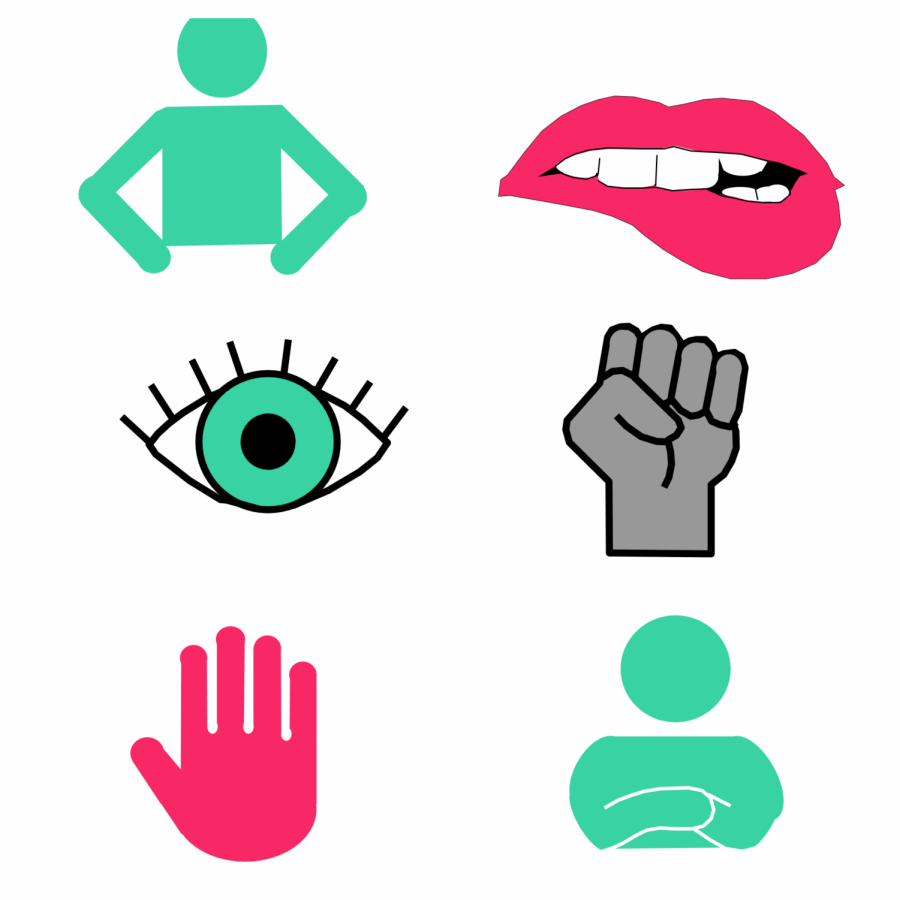Body Language
What the study of body language can reveal
December 18, 2018
Body language is the way people’s physical traits and actions convey information rather than their words. Kinetics is the study of these nonverbal cues and the application of said cues can lead to greater understanding during interactions with others. However, society today tends to not be familiar or proficient in the field of body language, but can easily learn.
“As humans, we express body language constantly throughout the day and in multiple environments,” said sociology teacher Mr. Luea. “Based on the environment in which we exhibit these non-verbal cues can indicate a variety of emotions that we are not or cannot willing express with our voice.
Today’s society revolves around digital communication. People often text, email, or google to find out information. Therefore, the study and application of body language cues has decreased, since the theory requires face-to-face communication.
“In regards to teenagers and body language, this process is especially important since this is the age where adolescents begin to interact with others much more on a daily basis and on a more mature level,” said Mr. Luea. “With the replacement of face to face conversations in favor of technology, we see teenagers who are less likely to pick up on social cues expressed by people they are conversing with.”
However, when given the opportunity, obtaining the knowledge of body language cues can be very helpful in revealing people’s true feelings, intentions, and thoughts.
“You can learn so much about someone and their personality just by recognizing their body language,” senior Ashley Adiwidjaja said. “It is also a useful form of nonverbal communication so you can send messages to certain people with gestures.”
A popular body language tactic is using it to show if someone is telling the truth. Psychologists Charles Bond, PhD, of Texas Christian University, and Bella DePaulo, PhD, of the University of California, Santa Barbara did a study with over 700 individuals that proved body language to accurately reveal deception among the study’s subjects.
“I can tell what people are really feeling or thinking by observing their body language. Many people say one thing but mean another,” said Adiwidjaja. “Being able to recognize certain body languages has helped me connect and relate to certain people.”
Although opportunities to analyze one’s body language is limited in today’s society, it still reveals a lot of information about the person one interacts with. With the limited face-to-face interactions today, many are not as aware of their body language and therefore, not as often required to disguise it.
“Unfortunately, technology has replaced in many circumstances the face to face communications that we engage in on a daily basis,” said Mr. Luea. “We are omitting from many of those conversations the usual facets of body language that would be a common part of interpersonal communication.”
Additionally, the study of body language can be found in pop culture today. The more psychologists are finding about about this inexact science, the more press it seems to be getting. For instance, in TV shows like “Brain Games” and “Lie to Me” capture cognitive links to physical mannerisms through the study of Kinetics.
“I have watched Brain Games,” senior Alex Kuron said. “However, I do think that teens are aware of body language [despite pop culture].”
Despite the numerable studies proving body language to be an accurate field, the study of it is still relatively new. Bond and DePaulo warn individuals that body language is an inexact science and although it often produces accurate readings, it shouldn’t be one’s sole factor in deciding someone’s thoughts, feelings, or intentions.
Body language is a unique topic with much relevance that many high schoolers are unaware of. The study of body language can add depth to interactions with others by revealing more than what the individual may verbally express. Additionally, the modern findings psychologists continue to make its an encouraging factor to further study body language and apply the knowledge to one’s daily life.
“The advantages of learning what our physical body tells other in immensely important,” said Mr. Luea. “Without the progressive learning of these signs of body language we become over time less likely to understand others emotional state of mind and more likely to continue to use technology as our main form of interpersonal communication.”



